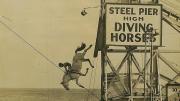Oy, such a provocative book this is—I’m telling you, I can’t tell you.
But funny?
Not so much, the comical picture of Groucho on the cover notwithstanding. Delving into the history, anthropology, sociopolitical utility, and moral value of Jewish humor has the same built-in limitations as analyzing sex—you really had to be there to fully appreciate what all the tzimmes [fuss] was about. Come to think of it, the book’s title may be intended to warn the reader not to expect a totally satisfying shpritz. Sarah Silverman, author Ruth Wisse is not.
What Harvard’s Peretz professor of Yiddish literature and professor of comparative literature does offer is a far-reaching discussion of the essential role humor plays in an ethnic group that historically has dwelt in the margins of the nations and cultures of others. Clearly, irony and satire often provided a palliative outlet for the Jewish outsiders, but this is only the starting point for Wisse’s analysis; she goes on to raise questions about both the appropriateness and the effectiveness of making funny when anti-Semitism has reached dangerous levels. Can humor abet the oppressor? Can it neurotically internalize the prejudices of the other? Can it subvert creative energies that would be better used to take effective political action?
Much of No Joke’s focus is on the extent to which Jewish humor traditionally has been aimed inward, satirizing the Jewish storyteller himself and other members of his tribe, as compared to poking fun at the dominant culture that surrounded him. (Wisse notes that only the Scots rival the Jews in lampooning their own stereotypes; apparently Scots tell barrelsful of skinflint jokes—at their own expense, so to speak.)
The most poignant and prevalent target of this humor are Jews who try to pass for gentiles. These stories and gags strike at the heart of the assimilation dilemma: how many steps in the direction of assimilation does it take to cross the line into unfaithfulness to one’s Jewish identity? And at what point does the assimilated Jew find himself ineluctably betraying his own people? Painful material, hilarious gags.
My personal favorite among such jokes (it is not in Wisse’s book) involves two Jews who pass a church displaying a sign promising $1,000 to all new converts. After much debate, one of the men decides to go for the money and enters the church. An hour passes, then another and another as the friend waits outside. Finally the Jew comes out of the church and his friend eagerly asks, “So, did you get the money?” The first man glares back and says, “Is that all you people ever think about?”
Oh, the levels, the levels. The joke pokes fun at the Jew not only as stereotypically money obsessed, but as all too eager to take on the persona, including the prejudices, of a gentile. Yet gentiles do not get away untarnished either; the converted Jew in the joke is a parody of gentile holier-than-thou-ness. At a secondary level, the question arises of whether there is a significant difference between a gentile telling this joke in public and a Jew telling it exclusively to other Jews. This raises yet another question, one that springs to Jewish lips so habitually that it has become a joke unto itself: Is this story “good for the Jews?” Finally, there remains the simple query: Shouldn’t the first and most pertinent question about any joke be, “Is it funny?” A scholar and social critic like Wisse might only shrug at this last question. Funny? Is that all you people ever think about?
Although the bulk of No Joke is a comprehensive and insightful historical survey of Jewish humor and its perpetrators, ranging from Heinrich Heine to Woody Allen, its recurring theme is the dangers of Jewish-wrought humor that is not “good for the Jews”—psychologically, morally, aesthetically, and politically. For Professor Wisse, such dangers are the serious questions.
For example, at the end of a section about the heyday of Borscht Belt comedians in the 1930s, a time when American Jews were beginning to prosper in the New World even as their European counterparts were falling under the repressions of Nazism and Stalinism, Wisse concludes: “What, then, are we to make of the fantastic spurt of Jewish laughter in the very years when American Jews ought, perhaps, to have been laughing less and doing more?”
The author’s either/or formulation—either laugh or take political action—may strike some readers as an unnecessarily strict mutual exclusion. People have been known to both laugh and act, even to act bravely. Some have even taken succor from laughter in a way that invigorates them to act bravely. This, sadly, was not the case for most American Jews in the 1930s, but is it reasonable and fair to blame American Jewish inaction on Milton Berle and Mel Brooks and their cackling Catskill audiences?
This finger-wagging attitude toward North American Jews and our supposed shallowness with regard to humor crops up in other contexts. Wisse recounts a personal story about attending a dramatic reading of Sholem Aleichem stories by a Yiddish actor in Montreal: “The actor had chosen a funny story and performed it well, but there was less and less laughter with every sentence. The humor was simply too dense—too intimate, too good. Rather than continuing with the second Sholem Aleichem story, our entertainer switched to a sketch by the American Yiddish humorist Moise Nudelman—a tale that was thinner in substance and heavily dosed with English. This went off much better, inadvertently showing us how much was gone from our culture….”
Clearly, the audience in this anecdote is being put down. They do not know good humor from bad, or richly layered European-born Jewish humor from adulterated, simple-minded, feel-good Jewish-American humor. I do believe that some of us American Jews have just been insulted, albeit humorlessly.
That’s funny, because insulting the audience has a long, sidesplitting history for Members of the Tribe. Don Rickles and Jackie Mason are only recent American incarnations of this tradition. No Joke takes us back to the golden era of Yiddish in Europe, when insults and curses, often uttered by uneducated women, were so delightfully serpentine—slipping artfully from blessing to stinger—as to be uproarious miniature comic fables in themselves. Here is one from the book: “May you have the juiciest goose, but no teeth; the best wine, but no sense of taste; and the most beautiful wife, but be impotent.” That insult is so delicious that the insulted could endure it with a measure of joy.
Alas, there is not much joy in No Joke. Obviously, writing seriously about humor, especially its potential to lead to shame and defeat, does not lend itself easily to funny expression. But does this mean such a book must be virtually devoid of fun and wit? The entire enterprise of evaluating humor by extraliterary standards, particularly moral and political standards, is very much with us these days. Comedians and just plain partygoers routinely endure serious condemnation for going outside the bounds of political correctness with their witticisms. Undoubtedly, this represents a step forward in sensitive civil behavior, but one cannot help wonder if something gets lost in the process. Something funny.
Daniel Klein ’61 is the coauthor, with Thomas Cathcart ’61, of Plato and a Platypus Walk into a Bar—Understanding Philosophy through Jokes (see “Joculor, Ergo Sum,” May-June 2007, page 26). Klein’s most recent book is Travels with Epicurus.









